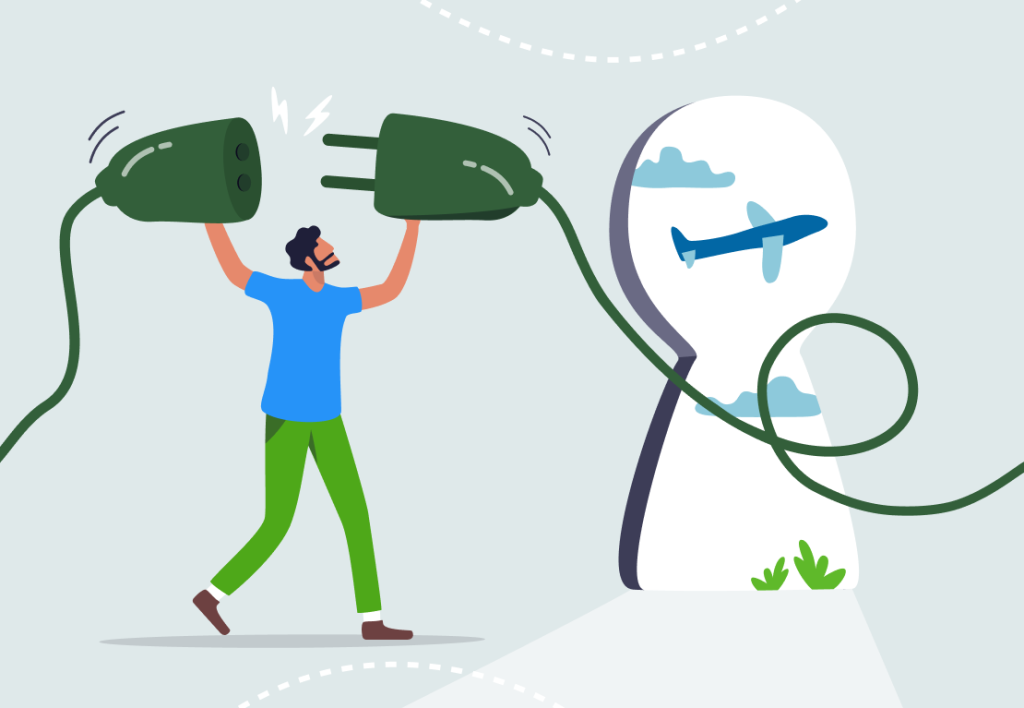Email’s impact on work-life balance has shaped an entire generation. Now, with productivity tools like Slack and Zoom, escaping work in your free time feels nearly impossible—even when you’re lounging on the beach. In many ways, the pandemic has worsened “grind culture,” the expectation of being constantly available for work, further erasing the boundaries between personal and professional life.
For travelers, these struggles stretch far beyond office hours: Stress and burnout steal the joy of a relaxing getaway. A well-known study in the Journal of Happiness Studies found that since it takes time to unwind after a busy work period and adjust to vacation mode, the full benefits of a break aren’t felt until at least eight days in.
This research heavily influenced later studies on stress and travel, including a 2018 survey revealing that 43% of Americans struggle to disconnect from work while on vacation.
Even when “out of office” doesn’t mean what it once did—and when silencing your phone feels unthinkable—there are still strategies to keep your vacation from turning into just another workweek.
We spoke to medical professionals and stress experts about the pressures of modern work life and how to safeguard your downtime.
Stress and its fallout
The COVID-19 pandemic intensified grind culture, mixing isolation, fear, grief, and anxiety into daily life. Experts say one reaction to this has been the “Great Resignation.” In August, the U.S. saw a record 4.3 million workers quit in a single month.
“From a young age, we’re taught that our worth is tied to our work—that if we don’t push ourselves to please employers and stay productive, we’ll end up in poverty,” says Devon Price, a social psychology professor at Loyola University Chicago and author of Laziness Does Not Exist.
As stress builds, our ability to regulate mood weakens, creativity suffers, problem-solving falters—and the body shifts into survival mode, explains Emily Nagoski, a health educator and author of Burnout: The Secret to Unlocking the Stress Cycle. Responses to burnout can include poor eating habits, loneliness, despair, alcohol misuse, and other harmful behaviors.
Pandemic stress can also take a physical toll, raising blood pressure, weakening immunity, and causing digestive issues.
“We keep pushing past our limits,” says Nagoski. “We’d never treat our pets this way, yet we do it to ourselves daily.”
Nagoski notes that burned-out travelers often catch a cold as soon as they arrive at their destination. This happens when the body has been pushed beyond its limits for too long, finally crashing when given a chance to rest.
“You can skip rest, but eventually, it’ll hunt you down,” Nagoski says. “It’ll grab you by the collar, throw you to the floor, and say, ‘I told you to lie down!’“
Stress, like any emotion, is “a tunnel,” she explains. Instead of moving through it by processing discomfort, many people numb themselves with TV, social media, or junk food—which rarely helps. True rest means facing and understanding the unease.
“We aren’t built to work nonstop—nor to sleep forever,” says Nagoski. “We’re meant to move through life’s rhythms. Wellness isn’t a mindset or a static state. It’s action.”
Easing the pressure
How can you leave worries behind on vacation? David B. Posen, a physician and stress management author, cites Mihaly Csikszentmihalyi’s research on “flow”—a state of deep focus where time and self-awareness fade.
Flow works “because you can’t focus on two things at once. If an activity demands concentration, that’s all your brain can handle,” says Posen.
Physical activity is a great way to enter flow. “My son climbs rocks—when you’re scaling a cliff, you’re not thinking about work,” Posen says. “You’re focused on your next move. The more engaging the activity, the more it absorbs you.”
Anything you love—even a gripping book—can induce flow. But doing isn’t the only solution. Sometimes stillness is the best stress reliever.
“Forgetting work happens naturally when you reconnect with yourself,” says Karma Lekshe Tsomo, a Buddhist nun and professor at the University of San Diego.
Meditation and breathwork foster mindfulness, helping people tune into their bodies and minds. Start by closing your eyes and counting breaths (“one” on inhale, “two” on exhale). “Meditation teaches us to value each moment,” says Tsomo. “You don’t need to be Buddhist—or even spiritual—just tune in.”
Gratitude also helps stabilize stress.
“Stability comes from family, friends, pets, nature, spirituality,” says Posen. “Focus on what you have. Listing small blessings can shift your mindset—write them down.”
Tips for a stress-free getaway
Experts recommend these methods to manage stress daily—and on vacation:
- Rest before traveling: Power down your phone after work, set email limits, and use out-of-office replies, says Price. Log out of work apps, shut your laptop, and stow it away. Spend downtime offline—read or pick up a hobby.
- Get creative: Art, crafting, or journaling helps process stress, says Nagoski. Expressing emotions externally signals your body to end the stress cycle, calming fight-or-flight mode.
- Connect with others: “Burnout is cured by community,” says Nagoski. “Surround yourself with people who don’t measure worth by paychecks or job titles.” Time with loved ones—or volunteering—shifts focus outward.
- Embrace nature: Posen suggests watching a waterfall or ocean waves. These rhythms soothe the mind and may even offer spiritual comfort.
